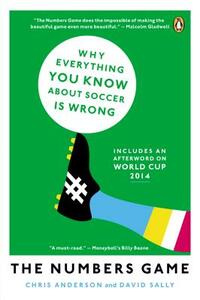Take a photo of a barcode or cover
26 reviews for:
The Numbers Game: Why Everything You Know about Soccer Is Wrong
David Sally, Chris Anderson
26 reviews for:
The Numbers Game: Why Everything You Know about Soccer Is Wrong
David Sally, Chris Anderson
[[ 2.5/5 ]]
The biggest drawback of this book is the fact is that it tries too hard. There are few interesting points though: the rise of analytics in football, the metrics used to understand the game, the distribution of results in a league, the substitution and penalty strategy. But apart from that, the book gets drab. Nevertheless, if you are a football fan you should definitely give it a read. It'll change your perception of the game.
The biggest drawback of this book is the fact is that it tries too hard. There are few interesting points though: the rise of analytics in football, the metrics used to understand the game, the distribution of results in a league, the substitution and penalty strategy. But apart from that, the book gets drab. Nevertheless, if you are a football fan you should definitely give it a read. It'll change your perception of the game.
Really interesting book that tries to apply numbers to a weak-link game like football. Well worth the effort even if you don't like football (in the same way moneyball was an excellent read though I had never watched a game of baseball)
Somewhat disappointing. I'm generally a believer in the points made in the book, so it was surprising that I found Sally and Anderson's arguments to be lacking. On one hand, they overstate "common belief", while on the other hand, their quantitative arguments tend towards the superficial with arbitrary data sets chosen to help prove their point. The model is clearly Malcolm Gladwell, which is not in any way to their credit. Their basic theses are likely correct, and for a novice fan, it's perhaps an entertaining look at the numbers. But there remains room for an insightful statistical analysis of the game.
I first encountered 'sabermetrics' in 1987 when I bought a Bill James Baseball Abstract from the long-lamented Sportspages book shop in Charing Cross Road. I quickly followed that purchase up with the Historical Abstract and then the 1988 Abstract. Since then I have been interested in 'sports analytics' as applied to other sports.
This book attempts to outline some discoveries 'soccermetrics' or whatever one wants to to call it have made about football. Unlike baseball, football is a game of near-constant motion and minimal statistics, so trying to translate the sabermetric approach to football is a bit of a Fool's Errand. One is basically reduced to taking the weakest element of sabermetrics -- the measurement of pitching and fielding in a team context -- and applying it to the entirety of the game. The Numbers Game doesn't really go even that far.
The basic elements it covers are:
1) What counts most in winning a football match, skill or luck?
2) How valuable are goals?
3) Is it better to have a great attack or a great defence?
4) Where do you want the ball before it goes into the back of the net?
5) How important are coaches?
6) What is the future of 'football analytics'?
My breakdown doesn't exactly mirror the chapters, but it does give a broad idea of the themes handled here. The answers are rarely surprising, except for that to (4), where the pioneering work of Charles Reep is not completely dismissed. But its value is in very specific circumstances.
It's not a difficult read, but unlike Bill James in 1987 it didn't completely change my appreciation of football matches. (The bit about corners probably had the biggest impact in that regard.) It seems all a bit too basic still, even compared to Bill James relatively unsophisticated research given the data baseball sabermetricians can use today, but despite that remains recommended for the thinking football fan.
This book attempts to outline some discoveries 'soccermetrics' or whatever one wants to to call it have made about football. Unlike baseball, football is a game of near-constant motion and minimal statistics, so trying to translate the sabermetric approach to football is a bit of a Fool's Errand. One is basically reduced to taking the weakest element of sabermetrics -- the measurement of pitching and fielding in a team context -- and applying it to the entirety of the game. The Numbers Game doesn't really go even that far.
The basic elements it covers are:
1) What counts most in winning a football match, skill or luck?
2) How valuable are goals?
3) Is it better to have a great attack or a great defence?
4) Where do you want the ball before it goes into the back of the net?
5) How important are coaches?
6) What is the future of 'football analytics'?
My breakdown doesn't exactly mirror the chapters, but it does give a broad idea of the themes handled here. The answers are rarely surprising, except for that to (4), where the pioneering work of Charles Reep is not completely dismissed. But its value is in very specific circumstances.
It's not a difficult read, but unlike Bill James in 1987 it didn't completely change my appreciation of football matches. (The bit about corners probably had the biggest impact in that regard.) It seems all a bit too basic still, even compared to Bill James relatively unsophisticated research given the data baseball sabermetricians can use today, but despite that remains recommended for the thinking football fan.
A breezy and enjoyable but informationally substantial read — combining statistics, logic, behavioural psychology, economics and history — that's a must for any analytically minded football fan (and we do exist). It's not THE definitive tome, a la Moneyball, but The Numbers Game has laid the groundwork for more and better insights in years to come.
